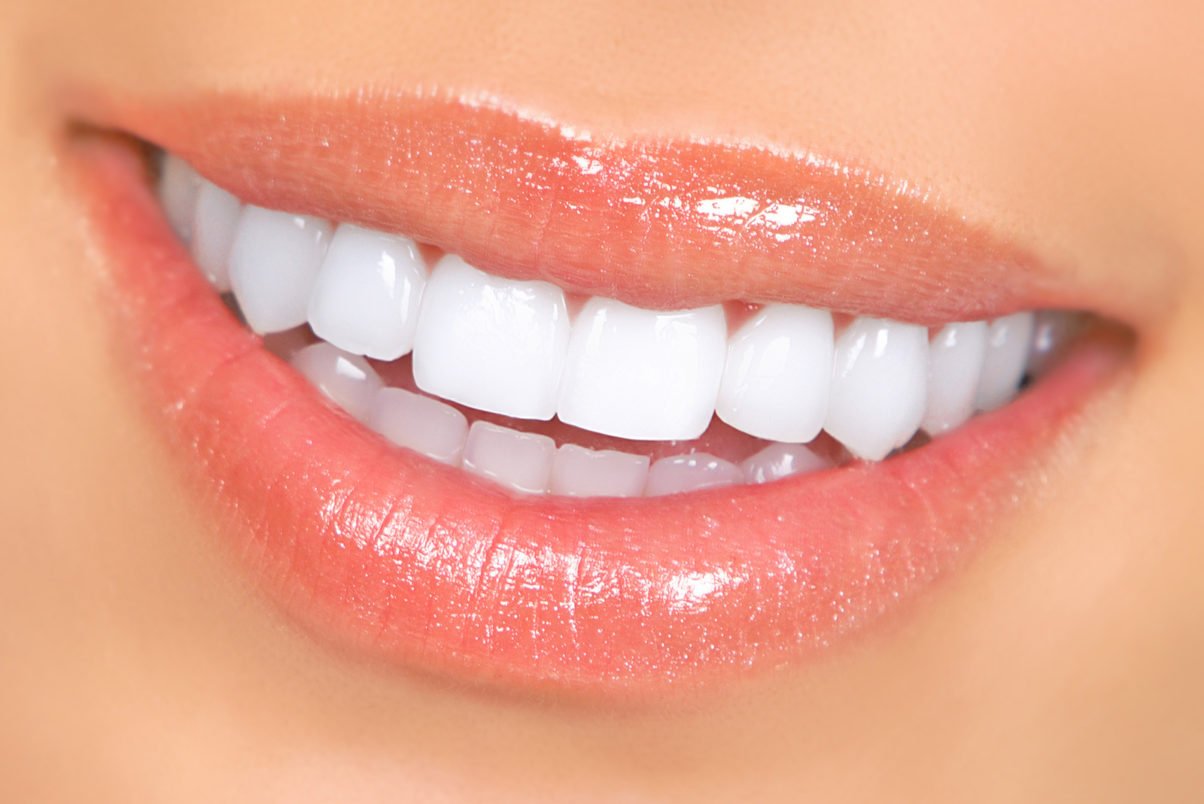Teeth whitening isn’t just for the rich and famous. These days, everyone seems to be seeking ways to make their teeth look whiter and brighter. Visit any grocery or drugstore and you will find shelves filled with tooth whitening products. Similarly, beauty magazines, blogs and websites often contain articles on DIY or “natural” whitening treatments for teeth.
Unfortunately, many of these products and remedies are ineffective at best and dangerous at worst. What makes this even more unfortunate is that top solutions for teeth whitening are both straightforward and affordable when performed by a cosmetic dentist.
Teeth Whitening Myths
With so much misinformation about teeth whitening on the internet, it’s hard to know what to believe. Here’s a list of common myths about whitening teeth.
1) Whitening Toothpaste is Effective
Many companies sell so-called whitening toothpaste, often at a higher price than standard products. Don’t waste your money on them. The chemicals needed to whiten teeth effectively must remain in contact with the tooth for an extended period of time. Since most people brush and rinse their teeth in a matter of minutes, any whitening ingredient in the toothpaste simply won’t get the chance to start working.
2) Coconut Oil Whitens Teeth
Many people use coconut oil in cooking, smoothies, and as a moisturizer for hair, face and body. In fact, coconut oil sales top $239 million annually, in part due to health claims made about the oil. One such claim is that swishing coconut oil around in your mouth, a holistic health treatment known as “oil pulling,” can whiten teeth. The practice of oil pulling dates back hundreds of years, according to the Journal of Ayurveda and Integrative Medicine. Despite the hype, however, there is no scientific evidence to support that coconut oil can whiten teeth.
3) Lemons and Strawberries Help Make Teeth Whiter
Some people use crushed strawberries or lemon juice to whiten their teeth. The problem with this method is that it may seem effective at first, but over time the acid in these fruits will eat away at your enamel, according to dental experts. This damages the teeth and can result in the need for additional dental treatment later.
4) Hydrogen Peroxide and Baking Soda are Safe DIY Teeth Whitening Solutions
Hydrogen peroxide and baking soda are not ideal whitening treatments. Baking soda can disturb the balance of good-to-bad bacteria in your mouth, possibly triggering oral health problems. Hydrogen peroxide can create free radicals, causing tissue damage.
5) Professional Tooth Whitening Isn’t Worth the Cost
While it is true that professional teeth whitening will cost you more than a kit purchased at your local drugstore, there is often a significant difference between the two experiences. Many people are pleasantly surprised to find out that professional tooth whitening is actually quite affordable. In addition, because the procedure is supervised by a dental professional, it is often safer and provides more satisfactory results.
Teeth Whitening Facts
Now it’s time to look at some real facts about whitening treatments for teeth.
Drugstore Whitening Products are Not the Same as Professional Whitening Solutions
The strength of the whitening gel used in professional dentist offices may be stronger than that which is available in an at-home whitening kit. While it is also true that very strong gels can cause tooth sensitivity and irritation, everyone is different. That is why working with an experienced cosmetic dentist is always a good idea. In addition, a dentist has significant experience in preparing custom whitening trays. A custom tray can help ensure that your whitening treatment gives you the results you desire.
UV Light Isn’t Necessary for Teeth Whitening
You may have seen dentists in movies or on TV using UV light as part of the tooth whitening process. The trouble is that there’s no real evidence that UV light improves results. In addition, exposure to ultraviolet radiation can itself be dangerous.
Children Should Wait to Have Their Teeth Whitened
It is an unfortunate fact that some children have stained or discolored teeth. There are many causes for this condition, including poor oral hygiene as well as the use of certain medications. In general, it is best to delay tooth whitening since the process may have a negative impact on a child’s developing teeth. A pediatric dentist can discuss your concerns with you and offer a realistic timeline for treatment.
Professional Whitening Treatments Have Never Been More Affordable
These days, it’s easy to get powerful professional whitening treatments that fit your budget. At Gentle Dental, our staff is ready to provide you with the information you need to make a decision about whitening services. One of our cosmetic dentists can review your case and provide you with a variety of options for improving your smile. Our office staff will work with you to make sure you can get the dental care you deserve at a price you can afford. We accept major credit cards and financing programs are available.
Your Questions Answered
Still have questions about teeth whitening? Here are some of the most common things people ask about this popular cosmetic dental procedure.
Can You Whiten Crowns?
Just like natural teeth, crowns can become stained over time. But can crowns be whitened? According to the American Dental Association, synthetic teeth can’t be whitened, and the only way to address staining or discoloration is to have the tooth replaced. If you are considering implants or veneers, it’s best to have your teeth whitened first since you won’t be able to address discoloration after your procedure has been completed.
How Long Does Teeth Whitening Last?
Professional teeth whitening treatments can last much longer than natural or over-the-counter remedies; however, they won’t last forever. You can make your results last longer by practicing good hygiene and by avoiding acidic and dark-colored foods that are known to stain teeth. While tooth whitening offers long-term benefits, the aging process can still cause your teeth to yellow over time. Fortunately, your dentist can assist you in addressing this through whitening touch-ups and provide you with some helpful teeth whitening tips.
Is Whitening Your Teeth Harmful?
With all the misinformation on the internet, you may be asking, is teeth whitening safe? Unfortunately, improper whitening techniques can cause long-term issues, including tooth sensitivity. Certain whitening products can also injure oral tissue. For these reasons, it’s important to get your whitening treatment from a qualified dental professional.
Does Teeth Whitening Damage Enamel?
When left on too long, some whitening procedures can damage enamel. Not only can this cause tooth sensitivity; it can also create tiny fissures in your teeth which can increase the risk of cavities. Again, it’s best to bypass at-home whitening treatments in favor of your local dentist who can help you achieve your goals while protecting your tooth enamel.
How Much Does Teeth Whitening Cost?
Professional, in-office teeth whitening can range in cost from a few hundred dollars to $1,000. Your actual costs will depend on the state of your teeth and the specific type of whitening treatment you choose. For more information, contact the professionals at Gentle Dental.
Do Teeth Whitening Strips Work?
Teeth whitening strips can whiten your teeth by whitening stains using carbamide peroxide or hydrogen peroxide. That said, they do not provide the same results as professional whitening treatments. In ideal circumstances, strips may be able to temporarily lighten your teeth by a shade or two.
Are Whitening Strips Bad for Your Teeth?
Whitening strips pose the same risk as traditional whitening treatments, including tooth sensitivity and tissue irritation. It’s important to use the product according to the manufacturer’s instructions to reduce the risk of complications.
Does Teeth Whitening Hurt?
When performed in a professional setting, teeth whitening treatments should be pain-free. At-home treatments have a greater risk of tissue irritation because people tend to make mistakes when using them. To minimize your risk of problems, it’s best to seek treatment from an experienced dental professional.
What to Eat After Teeth Whitening
After your teeth whitening treatment, it’s important to eat foods that are clear or white to avoid staining your teeth. This includes white sauces, plain chicken and fish, white rice, plain pasta with butter and egg whites. You should limit your beverages to water or milk. After about a day, you can return to your normal diet; however, try to avoid dark-colored foods as much as possible or you will have to get your teeth whitening regularly to maintain your results. This includes coffee, tea, and red wine, according to the ADA.
Will My Teeth Be Yellow Forever?
If your teeth are discolored, there are things you can do to improve their appearance. As with most things health-related, prevention is always preferable to treatment. You can prevent tooth discoloration and staining by regularly brushing and flossing, avoiding smoking, limiting the consumption of beverages that stain teeth (such as tea, coffee, and wine), and getting regular professional cleanings.
If your teeth are already discolored, however, it’s a good idea to speak with one of Gentle Dental’s experienced cosmetic dentists. Our professionals can evaluate your teeth and make recommendations regarding improving their appearance. Our staff is also happy to assist you with understanding treatment options and managing costs.
Get closer to your perfect smile. Book your next appointment at a Gentle Dental location near you.


 Previous Article
Previous Article
